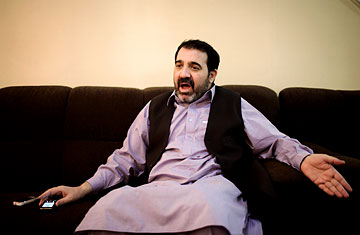
Ahmed Wali Karzai at his house in Kandahar City, Afghanistan, on Aug. 14, 2009
If, as is alleged by the New York Times, Ahmed Wali Karzai has been on the payroll of the CIA ever since the U.S. arrived in Afghanistan eight years ago, that may be a sign of just how dysfunctional the U.S. strategy there has been. The Times claimed on Oct. 27 that the agency paid the half-brother of Afghan President Hamid Karzai to help recruit and maintain an anti-Taliban paramilitary force in the southern city of Kandahar. He is also said to have rented the agency a kitschy mansion, formerly owned by Taliban leader Mullah Omar, with pink chandeliers and landscape murals in the hills outside Kandahar for use as a base for the CIA and U.S. special forces. Ahmed Wali Karzai has also been repeatedly accused of involvement in Afghanistan's multimillion-dollar drug trade.
Whether or not he was paid by the CIA, it's far from clear that, on balance, his activities have helped rather than hurt the U.S. cause in Afghanistan. For example, tribal leaders in the Pashtun south and U.N. observers of the recent, tainted election accuse Ahmed Wali of blatantly rigging the vote to secure his brother's re-election as President. Vote-rigging has sabotaged the U.S. goal of strengthening the legitimacy of the government, which is being defended by more than 60,000 U.S. troops.
"Ahmed Wali went flat-out to subvert U.S. policy in these elections, but no political price was paid by either him or his brother," says Michael Semple, an Afghan specialist with the Carr Foundation for Human Rights in Cambridge, Mass. President Karzai was eventually forced to accept a runoff presidential race because more than a million first-round votes, most of them for the incumbent, were deemed fraudulent.
The Times report claimed that Ahmed Wali had helped set up a paramilitary unit known as the Kandahar Strike Force, which was supposed to assist the CIA and U.S. special forces in hunting down suspected Taliban cells in the area around the city. But, says a Western security expert who worked in Kandahar and asked to remain anonymous, those targeted by the Strike Force were often known locally to be Ahmed Wali's personal foes. "If somebody was a business rival of Ahmed Wali or if they hadn't paid their protection money, you can be sure they'd get a knock on the door by the Kandahar Strike Force," the security expert says. In June, the Strike Force shot and killed the city's respected police chief while trying to release the brother of one of its members from jail.
If the allegations are true, the most troubling aspect of the CIA connection with Ahmed Wali Karzai may be the persistent reports of his ties to the Afghan drug trade — which is also a major source of funding for the Taliban. From December 2001 though 2002, according to a former Drug Enforcement Administration official speaking on condition of anonymity, "the CIA and the military turned a blind eye to drug traffickers if they thought they could help them against Taliban and al-Qaeda."
President Karzai has repeatedly promised to punish his brother if presented with clear evidence that Ahmed Wali was involved in the drug trade, but he insists he has never seen any. Senate Foreign Relations Committee chairman John Kerry, just back from Afghanistan, said top U.S. officials had repeatedly assured him that there was "no hard evidence" to back the narcotics allegations against Ahmed Wali. Following the allegations published by the Times, however, Kerry demanded that the Administration brief Congress on any "entanglements" between Ahmed Wali and the CIA or drug traffickers. "We should not condemn Ahmed Wali Karzai or damage our critical relations with his brother, President Karzai, on the basis of newspaper articles or rumors," said Kerry.
However, former ABC News producer Gretchen Peters, author of an exposé on the Afghan drug trade, Seeds of Terror, suggests the allegations are not confined to rumors or media articles. She asserts that U.N. reports placed Ahmed Wali at the top of "an organization chain" that included governors, police officers and customs officials who allowed opium cultivation and the movement of drugs out of Afghanistan. Earlier this year, British troops raided a house belonging to Ahmed Wali that contained a huge opium haul. Ahmed Wali denied any knowledge of the opium, and the matter was allowed to drop.
Despite the timing of their release, the new allegations of Ahmed Wali's ties to the spy agency are unlikely to have any impact on his brother's prospects in the runoff election against challenger Abdullah Abdullah. Most Afghans are set in their views of President Karzai and see him and his clan as so close to the U.S. that the CIA allegations would scarcely raise an eyebrow. Where the allegations could matter, however, is in the debate in Washington over whether to double down or scale back the U.S. commitment in Afghanistan. Those who advocate expanding U.S. involvement in order to stand up a legitimate Afghan government may be tempted to point to the allegations over Ahmed Wali Karzai as a cautionary tale of the perils of relying too heavily on local tough guys.
